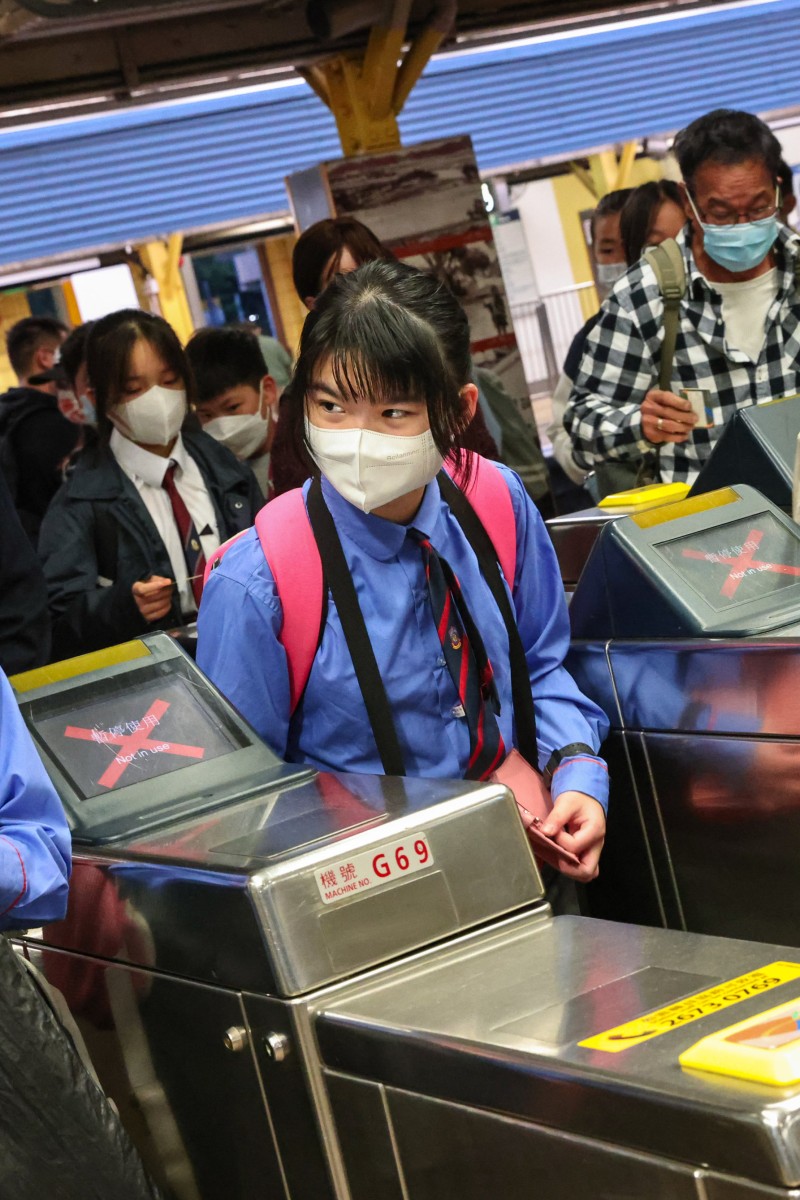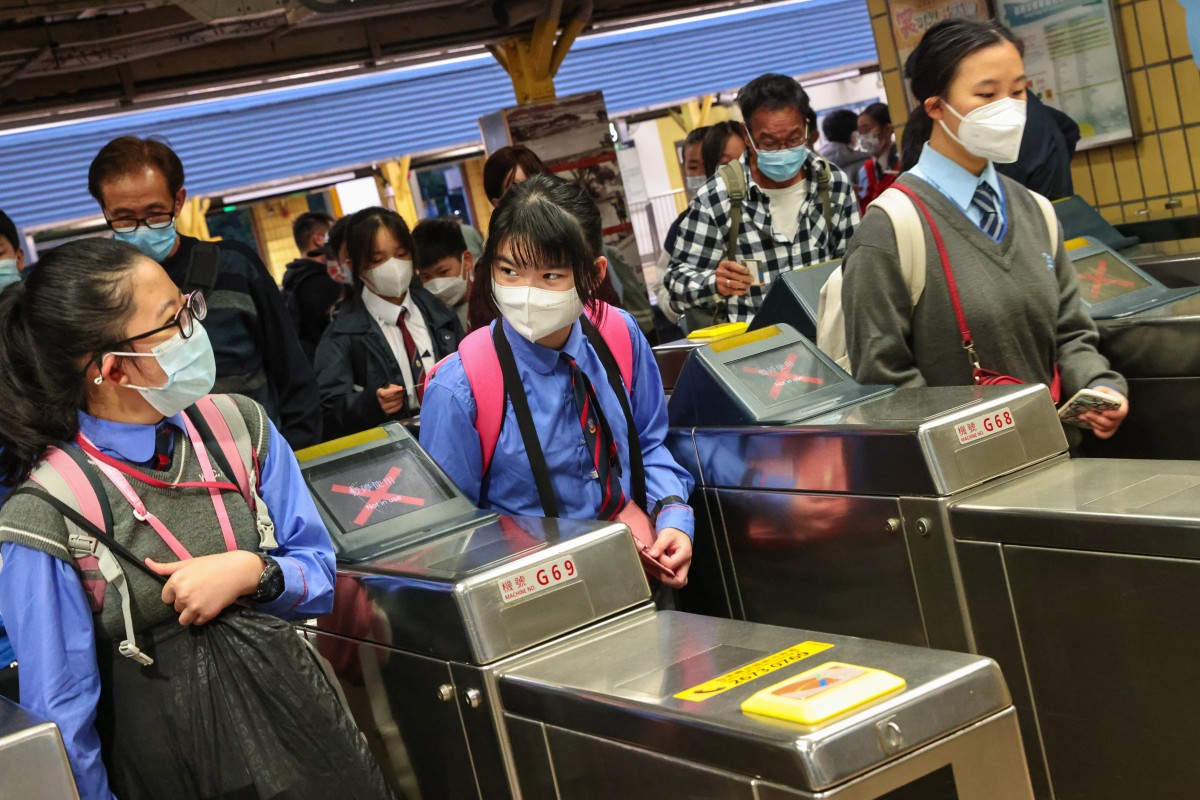
Masking social anxiety: why some Hong Kong teens still use face coverings, ‘need time to adjust to the new normal’
- Students who still wear face coverings share how Covid pandemic has made them more self-conscious and worried about how peers will judge them
- Psychologists stress that avoidance will only lead to more problems and encourage young people to reach out for help to confront their fears
 In a survey published this month, 11 per cent of pupils polled still wear masks because they lack confidence in their appearances, while 7.2 per cent feel uneasy with social interactions. Photo: K.Y. Cheng
In a survey published this month, 11 per cent of pupils polled still wear masks because they lack confidence in their appearances, while 7.2 per cent feel uneasy with social interactions. Photo: K.Y. ChengFour months since Hong Kong lifted its mask mandate, 17-year-old Melody Ma still wears one every day, not to shield herself from disease, but to hide.
“I want to control how much of myself I reveal to others and avoid the possibility of negative comments,” said the student from Carmel Pak U Secondary School.
The teen is not alone in her fear of removing her mask.
This month, the Evangelical Lutheran Church Social Service published a survey which found that more than 80 per cent of the 2,500 pupils polled still wore masks.
80 per cent of Hong Kong students are still wearing masks
Though over 44 per cent of pupils said they continued wearing masks because of health concerns, almost 11 per cent cited lack of confidence in their appearance, while 7.2 per cent said they were uncomfortable with in-person social interactions.
Sophia Ling, a student at German Swiss International School, said she regarded masks as a layer of protection from comparison and judgment.
“I tend to wear a mask more often in situations where I feel insecure or self-conscious about my appearance such as at school where I am surrounded by classmates who I think are really pretty,” the 11-year-old said.
‘I need time to adjust to the new normal’
Melody had always been a shy person, but before the pandemic, she still enjoyed social gatherings without too much concern about her appearance.
But after the mask mandate began, the teen said she felt less confident and got used to wearing face coverings to hide her “imperfections”, naming her freckles as a reason for being self-conscious.
“I have watched some live streams on YouTube or Instagram where people take off their masks, and I’ve seen how quickly the comments can turn from positive to negative,” the student said.
“It’s easy to feel anxious and insecure about showing my face to others, especially if I’m worried about receiving negative comments.”
Not only does Melody feel more self-conscious about her looks, but she has also become less confident about her social skills.
When schools switched to online learning and social-distancing rules were implemented, the teen had few chances to meet people. When she did, she struggled to read their reactions with a mask on.
Thus, she felt her social skills became rusty.
Psychologist explains how social anxiety affects teens, when to get help
“With fewer opportunities to socialise with others, I found myself struggling to connect with people when restrictions began to lift,” the student said, adding that she could feel her social anxiety kicking in more often.
“Change in the mask mandate has caused me discomfort, and I need time to adjust to the new normal,” she shared, adding that she often avoided social gatherings if they required her to remove her mask.
“I used to enjoy those meetings a lot, but now I have to decline using various silly reasons, like ‘I have a cough, cannot join you guys’ or ‘I have to take my cat to the clinic’ ... even though they are not true most of the time.”
Avoidance leads to more anxiety
Dr Karen Liem, a clinical psychologist with more than 10 years of experience in Hong Kong, said it made sense why teenagers would feel safer behind a mask.
“Wearing a mask makes them feel that people cannot really see them, and hence, [they’re] less vulnerable to others’ judgment of their looks,” Liem said.
“It can cover up pimples or blemishes which is a common trouble during puberty.”
According to the expert, most people avoid what triggers their fear, and masks are an easy way to steer clear of scrutiny. But this ends up causing more problems.
“If they continue to wear masks ... they are deprived of opportunities to face their fear, learn to overcome it, and realise that they can cope with their anxiety in social situations,” the psychologist stressed, warning that they might end up getting “stuck in the anxiety spiral”.
“The feared situation has never really been overcome because the person always avoids it.”
Why a social worker writes role-playing games on bullying, mental health
Tracy Cheung, a registered psychotherapist in Hong Kong, emphasised that the root of the issue was deeper than masking. She pointed out that unattainable beauty standards perpetuated on social media were a large contributor to teens’ fears about being judged.
“Social media serves as a powerful platform for unrealistic social comparison. Teenagers often ... make upwards social comparisons with influencers or a successful person which can make them feel they are not good enough, ” said the member of the Hong Kong Professional Counselling Association.
“It can have a big impact on happiness, body image, self-esteem and anxiety in teens.”
Small steps pay off in the end
Nelson Li Hong-zhe, a student at Singapore International School, said he felt comfortable without his mask, but he could relate to pupils who feared removing them. He used to be overweight and had acne, so he felt nervous about meeting others.
“People would constantly comment on my appearance, both behind my back and to my face,” the 16-year-old said.
But he faced the issue head-on: “Over time, it just struck me ... how far I’ve come.”
Psychologist explains how fear of rejection drives others away
The experts had a few tips for how teens could address their social anxiety around masking.
First, they need to identify the negative thoughts by naming how they feel, and then learn to challenge these perceptions with positive affirmations. A mood-tracking app or journal can help with this.
When these fears are too overwhelming to put into words, Cheung suggested a few strategies to bring you into the present: deep breathing or holding an ice cube and focusing on the temperature. Going into nature and exercising can also help boost your mood.
Parents should also validate their children’s feelings and create a safe environment where teens feel supported in facing their fears, Cheung advised.
For teens who find they cannot deal with their anxiety on their own, Liem noted that seeking professional help or support groups could be helpful.
The psychologist emphasised that taking these small steps to face one’s fears would eventually pay off.
“To overcome anxiety, we must find the courage to push ourselves to face the feared situations. With repeated and gradual exposure, one will find that things become easier and more manageable,” Liem said.